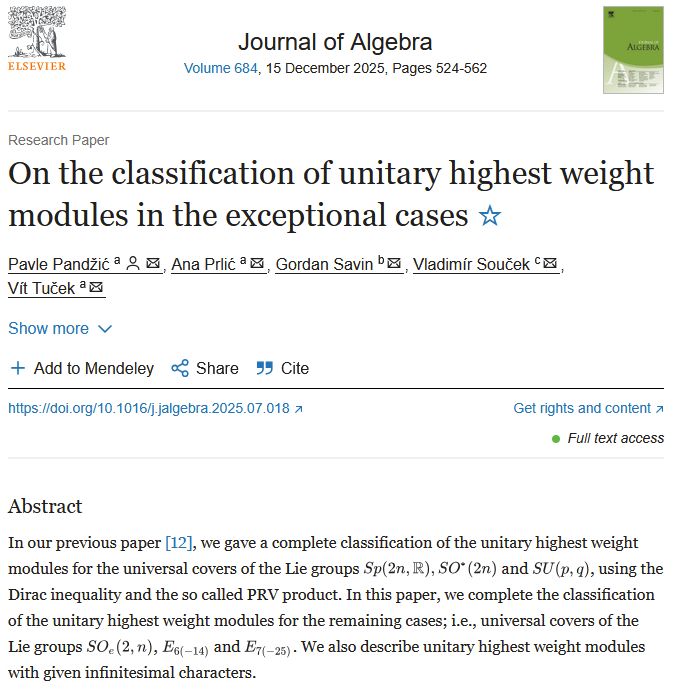
This is the reason I am still active on MathOverflow. You get to learn something and you meet nice people.
mathoverflow.net/a/507688/6818
@tucek.bsky.social
mathematician (differential geometry, representation theory), data analyst and Python developer

This is the reason I am still active on MathOverflow. You get to learn something and you meet nice people.
mathoverflow.net/a/507688/6818

Long time ago a friend asked me to finish article that was started by his student. That's how I learned about octonions and exceptional Lie groups. mostly from the go to introductory text by John Baez. Now, around 15 years later, I was able to actually answer a question of Baez.
17.09.2025 14:33 — 👍 0 🔁 0 💬 1 📌 0
minily.org/5m1YwldYxH
06.08.2025 07:04 — 👍 0 🔁 0 💬 0 📌 0Auto jsem koupil až když se narodil prcek a začaly časté jízdy za prarodiči. Je to skoro dvakrát dražší než ho nevlastnit a půjčovat.
08.12.2024 08:24 — 👍 0 🔁 0 💬 0 📌 0
*AI for Mathematics and Theoretical Computer Science*, a workshop hosted jointly by the Simons Institute for the Theory of Computing and the Simons Laufer Mathematical Sciences Institute, will be held in Berkeley at April 7-11, 2025.
simons.berkeley.edu/workshops/si...
My master thesis is called Applications of tractor calculus. 😎
03.12.2024 20:38 — 👍 1 🔁 0 💬 0 📌 0I made a Starter Pack for #MathSky, since the one @tienchihmath.bsky.social made (go.bsky.app/66Us7WW), is at max capacity. But I need your help! Let's crowdsource this to make it better. Reply with suggestions. **Please don't feel shy to self-nominate!**
go.bsky.app/GiRFQ8D
My pleasure!
01.12.2024 18:34 — 👍 1 🔁 0 💬 0 📌 0How about bsky.app/profile/barb... ?
I'm on mobile and I don't know how to check the presence on the list.
Can you please add me?
01.12.2024 18:12 — 👍 1 🔁 0 💬 1 📌 0I know two of the authors. Feel free to throw any questions at me and I'll relay them to Brano and Jiří over our traditional post-seminar beer.
29.11.2024 23:13 — 👍 1 🔁 0 💬 1 📌 0Can you please add me to the list?
27.11.2024 16:31 — 👍 1 🔁 0 💬 0 📌 0But now we are in largely uncharted territory.
Is the extra freedom in choosing codebooks worth it?
How do we decode?
How do we pick good codebooks?
Can one actually implement this on real hardware?
What about multiuser scenarios?
Let me know if you want to know more.
10/n
n=10
So instead of choosing a codebook consisting of vectors, we can choose a codebook consisting of M-dimensional subspaces.
What have we gained?
1. H is completely irrelevant
2. codebooks live on much bigger space: the complex Grassmannian Gr(M, T)
9/n
We assume that H doesn't change for T instances of x_i and so we can stack T equations together:
Y = HX + Z
where now Y and X are N×T and M×T matrices respectively.
We further assume M<T and H of max rank.
The crucial observation is that HX and X has the same row space.
8/n
In a mobile situation H changes frequently and so we have to estimate its MN complex entries again. That can take a big part of your window of opportunity until H changes again.
Is there a better way?
7/n
and then we approximate MLE for x_i constrained in a predetermined codebook (which is of size 2^k).
Do you see the problem?
6/n
So for 4g, 5g & next generation of wireless networks we are looking at M × N complex matrices H of increasing size. That poses some challenges in decoding the sent data x_i from the received y_j.
The way it currently works is we first estimate H by sending pilot signals known to both sides...
5/n
and H is the so-called channel matrix that captures all the reflections and occlusions by buildings and hills etc.
Turns out that adding more antennas has benefits that have to do with the fact that the high dimensional normal random vectors tend to concentrate on the sphere.
4/n
The simplest function is linear y = Hx but we have to account for (white additive Gaussian) noise. Hence our basic relationship between transmitted and received signal is
𝑦=𝐻𝑥+𝑍
where Z is iid complex Gaussian random vector...
3/n
You have M antennas at the transmitting side & N antennas at the receiving side. The i-th transmitting antenna sends an EM wave x_i and the receiving party obtains y_j on its j-th antenna. Since the EM wave carrying the signal has two degrees of freedom, we can view this as a map 𝑥∈ℂᴹ→𝑦∈ℂᴺ.
2/n
Complex Grassmannians in the wild
#math #signalprocessing #manifold #optimization
There is a neat approach to wireless communication based on Grassmann manifolds over the field of complex numbers. It's an idea about 20 years old and it's easy to explain. Here is how it goes:
1/𝑛
Can you please include me? Thanks!
27.11.2024 14:48 — 👍 0 🔁 0 💬 0 📌 0Can you please include me? Thanks!
27.11.2024 14:45 — 👍 0 🔁 0 💬 0 📌 0Thanks.
23.11.2024 18:18 — 👍 1 🔁 0 💬 0 📌 0You mean uniform distribution on O(n)?
23.11.2024 17:49 — 👍 1 🔁 0 💬 1 📌 0Nice! Do the three properties characterize Gaußian distributed matrix variable or is there some other?
23.11.2024 16:31 — 👍 1 🔁 0 💬 1 📌 0Yes please!
22.11.2024 17:11 — 👍 1 🔁 0 💬 1 📌 0